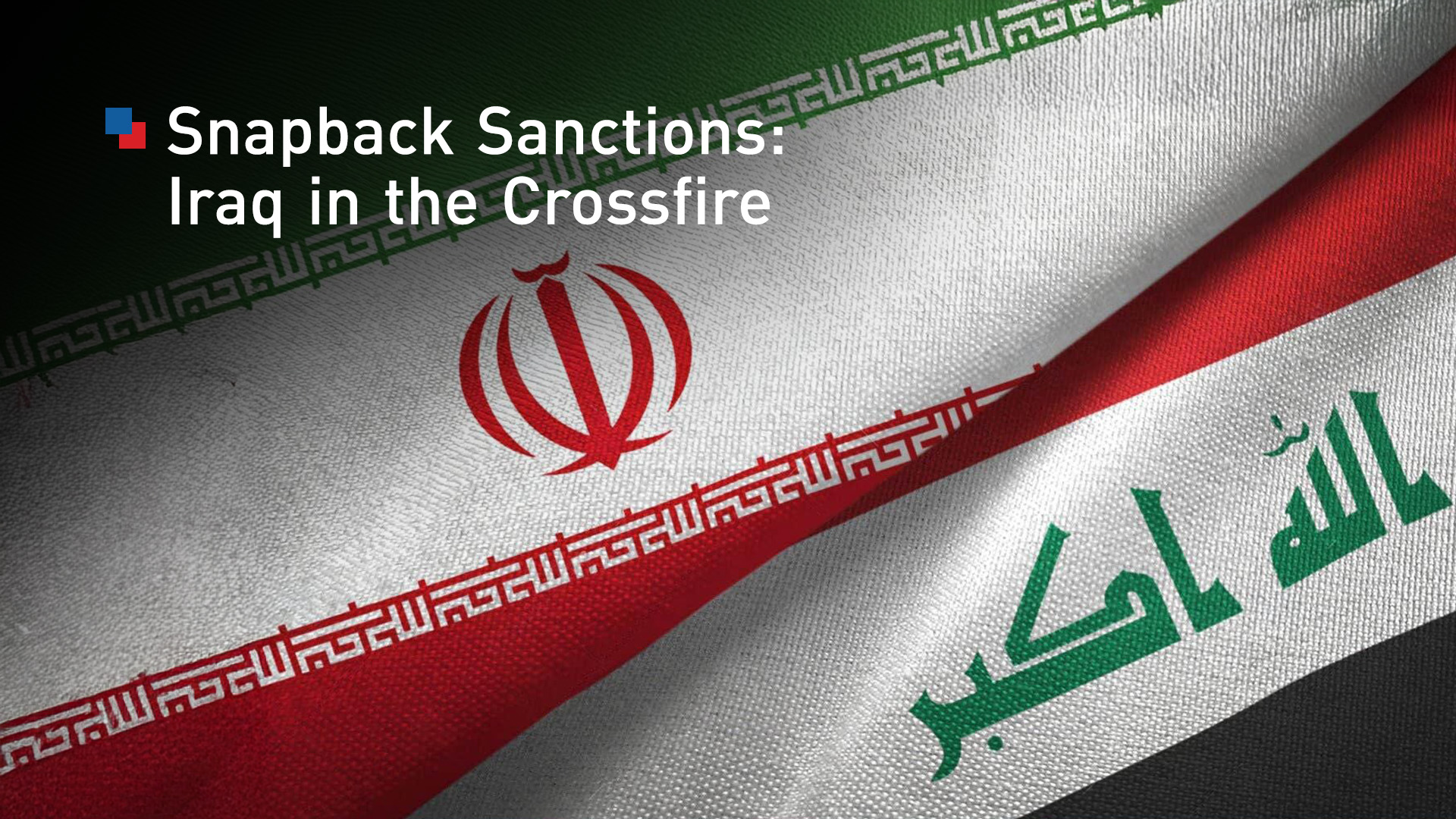Caught Between Giants: Iraq Faces US-Iran Pressure Amid UN Snapback Sanctions on Iran
Iraq Struggles to Navigate US-Iran Rivalry Amid UN Snapback Sanctions, Economic Risks, and Militia Pressure

ERBIL (Kurdistan24) — Iraq has been warned it must comply with newly reimposed United Nations sanctions on Iran or face punitive measures itself, as Washington intensifies pressure on governments worldwide to enforce restrictions against Tehran, according to Kurdistan24 sources in Baghdad.
The sanctions, reinstated under the UN “snapback” mechanism, target Iran’s overseas assets, financial networks, and arms transactions, as well as its ballistic missile program.
US Secretary of State Marco Rubio issued a stern message to all states, stressing that non-compliance would carry consequences. For Iraq, however, the mandate represents a particularly difficult challenge.
Iraq’s Fragile Position Between Washington and Tehran
Iraq shares a 1,600-kilometer border with Iran, and bilateral trade is estimated at around $25 billion annually. From electricity imports and food supplies to cross-border fuel smuggling, Iraq’s economy is deeply enmeshed with its eastern neighbor.
Experts warn that enforcing sanctions could destabilize Iraq’s already fragile economy, while ignoring them risks exposing Baghdad to US penalties and international isolation.
University lecturer Mohammed Kahlawi told Kurdistan24 that most commercial exchanges between Baghdad and Tehran will inevitably stall:
“They [US] will monitor borders, trade flows, and the use of US dollars. This will harm Iraq’s economy, because we are heavily dependent on Iranian goods and trade. Even oil smuggling between the two countries generates profits on both sides—and now that too will be curbed.”
Iraqi Political analyst Ali Habib noted that Iraq relies on Iran for up to 20% of its agricultural imports. Cutting these supply chains, he argued, would be devastating:
“Iraq has also become a major conduit for smuggling Iranian oil and goods. If Baghdad halts this, it risks humiliation in the eyes of Tehran, but if it doesn’t, it risks sanctions itself.”
The Militia Factor: Enforcers or Evaders?
Iran-backed militias inside Iraq—many of which are formally integrated into the Popular Mobilization Forces (PMF)—stand to play a central role in the sanctions battle. These groups have long facilitated the smuggling of oil, fuel, and hard currency across porous borders.
Experts say they are likely to find new ways to circumvent sanctions, channeling revenues back to Tehran while maintaining their own networks' profitability.
The militias’ entrenched control over parts of the Iraqi border makes them well-positioned to bypass international monitoring efforts. US officials have repeatedly urged Baghdad to rein in these armed factions, warning that failure to do so could expose Iraq to further instability and international penalties.
Can Iran Use Iraq as a Sanctions Loophole?
Tehran has historically relied on Iraq as both a political ally and an economic lifeline during sanctions. Experts believe Iran will now lean heavily on its influence over Iraqi politics and security institutions to soften the blow of renewed restrictions.
Iran’s tools include:
- Political leverage: Tehran’s allies within Iraq’s parliament and government can obstruct the strict enforcement of sanctions.
- Militia networks: Smuggling routes for oil, fuel, and goods can be rerouted through militia-controlled territories.
- Financial channels: Dollar auctions run by Iraq’s central bank, already scrutinized by the US, could once again be exploited to funnel hard currency to Iran.
- Religious ties: Pilgrimage routes and religious tourism, which bring millions of Iranian visitors to Iraq annually, provide cover for cash and goods transfers.
A Looming Strategic Crisis
For Baghdad, the sanctions issue is not simply about trade—it is about sovereignty and survival. Iraq is caught between its two most powerful partners: the United States, which provides vital financial and military support, and Iran, whose political and economic reach is deeply entrenched.
Failure to comply with UN sanctions could trigger penalties that cripple Iraq’s banking system and further strain its dollar liquidity crisis. But aggressive enforcement risks provoking backlash from powerful militia groups and undermining Iraq’s delicate internal stability.
As Habib put it: “This is a different kind of pressure. Iraq cannot simply ignore it. If it does not comply, Iraq itself will become the target of sanctions.”
Forward-Looking: US Enforcement Tools and Risks
Washington has a range of tools at its disposal to ensure Iraq’s compliance or penalize non-compliance:
- Targeted sanctions on Iraqi banks: US authorities could restrict international dollar transfers for banks facilitating Iranian transactions, effectively cutting off access to global financial networks.
- Heightened monitoring of dollar auctions: The US may intensify oversight of Iraq’s central bank auctions, scrutinizing any Iranian involvement or currency flows that violate UN sanctions.
- Sanctions on militia leaders: Individuals linked to Iran-backed PMF units could be directly sanctioned, freezing assets and restricting travel, to disrupt the networks that facilitate sanctions evasion.
- Diplomatic pressure and conditional aid: US assistance—financial, military, or technical—could be conditioned on Iraq’s active compliance, creating leverage to influence Baghdad’s enforcement policies.
- Border and trade surveillance: Increased monitoring of cross-border fuel, oil, and goods flows may be imposed, potentially involving US or coalition advisors on the ground.
Conclusion
With the snapback sanctions now in motion, Iraq faces a defining test: whether it can navigate the complex intersection of economic dependency, militia influence, and international pressure—or whether it will once again serve as a battleground for the unresolved US-Iran confrontation.
The coming months are likely to determine not only Baghdad’s foreign policy alignment but also the internal balance of power between the state, militias, and Iran-backed political actors.